
| WWT Shows | CLICK TO: Join and Support Internet Horology Club 185™ | IHC185™ Forums |

|
• Check Out Our... • • TWO Book Offer! • |
Welcome Aboard IHC185™  Internet Horology Club 185
Internet Horology Club 185  IHC185™ Discussion Site Main Page
IHC185™ Discussion Site Main Page  Horological Discussions, Questions and Answers
Horological Discussions, Questions and Answers  Military Timepiece Discussions - EXCLUSIVE!
Military Timepiece Discussions - EXCLUSIVE!  The IWC Mark 11 and a piece of history.
The IWC Mark 11 and a piece of history.
 Internet Horology Club 185
Internet Horology Club 185  IHC185™ Discussion Site Main Page
IHC185™ Discussion Site Main Page  Horological Discussions, Questions and Answers
Horological Discussions, Questions and Answers  Military Timepiece Discussions - EXCLUSIVE!
Military Timepiece Discussions - EXCLUSIVE!  The IWC Mark 11 and a piece of history.
The IWC Mark 11 and a piece of history.Go  | New Topic  | Find-Or-Search  | Notify  | Tools  | Reply to Post  |  |
Welldone, Werner...! Another mistery is not a mistery any more!! This is what I mean with the word "historian"... | ||||
|
Claudio...good to hear from you again, yes mysteries are there to be solved, even good historians can learn a thing or two, if they are prepared to look and listen! All the best to you. My WWW collection is now complete, time to look for new ventures! | ||||
|
I also have a 1948 Mark II IWC with military markings and broad arrow stamped into the case back however, it does not have the circled T or arrow printed on the dial and the IWC signature is on two lines, has anyone seen this type of dial before?. 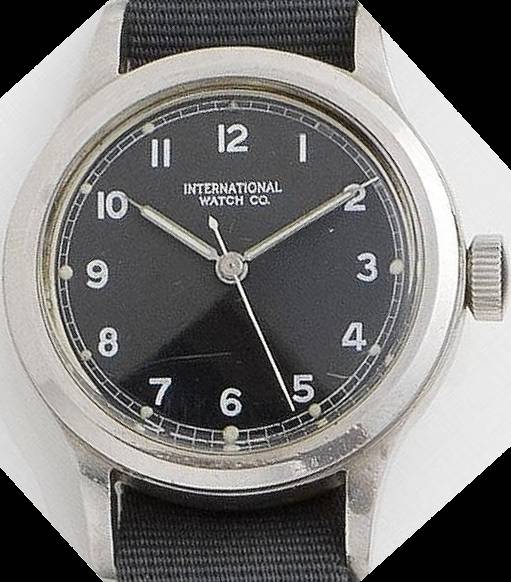 | ||||
|
before I say Fake, could you post a picture of the back and movement? My WWW collection is now complete, time to look for new ventures! | ||||
|
I will get the back removed then post images of it and the movement, I have also found an article with picture of the same dial, image attached. 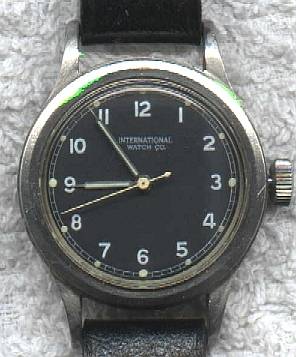 | ||||
|
one thing for sure, the dial is not a military version! My WWW collection is now complete, time to look for new ventures! | ||||
|
Herewith images of the case back and movement, if this is not a military IWC then what is it? 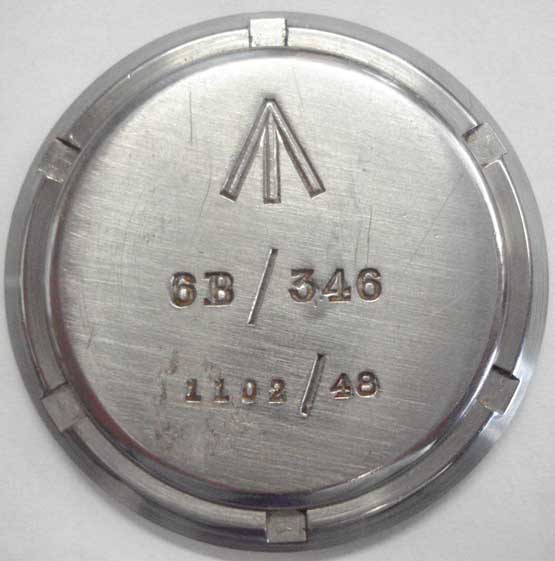 | ||||
|
The movement 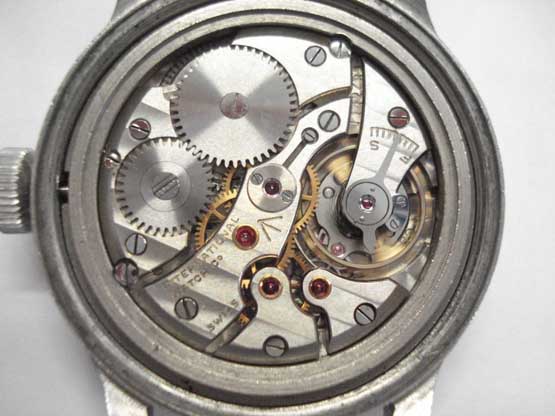 | ||||
|
I am not an expert on the markings on the back and movement, but the dial is incorrect to at the least I would believe it to be a replacement. | ||||
|
[/]This is an original "first generation" dial which never had the circled T because back in 1948 there was no known danger regarding radium and use of military arrow on dials was not in general use, attached is an image of the equivalent military Jaeger Watch Company Mark II first generation dial which as can be seen does not have either the T or arrow, this dial can be seen at the following link: http://www.markeleven.com/ 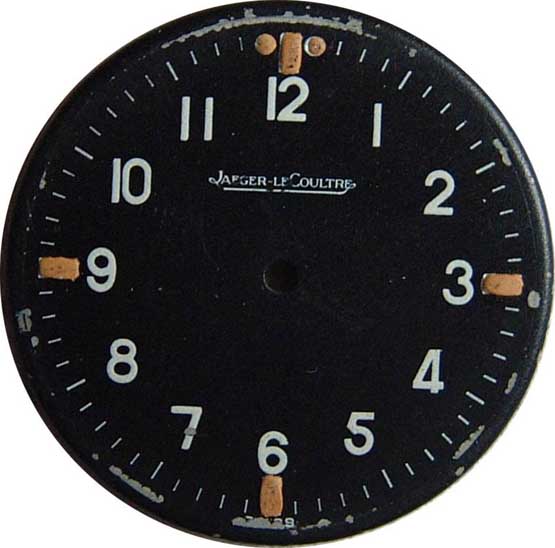 | ||||
|
Furthermore, the IWC "First Generation" dial can be seen at this link: http://www.fortunecity.com/oly...gner/379/Mark.XI.htm | ||||
|
That isn´t a first generation IWC dial, it´s a later added civilian dial version which was produced around 1984, not original IWC, not authentic, certainly not a military dial. The movement and case back are correct. I´ll put this question to Thomas Koenig, the co-author of the publication Man is not lost in the Horological Journal. Even the Civillian BOAC watch dials were different to the one you show! Here´s an excerpt from the article; The label ‘International Watch Co.’, slightly inexact in printing, is written in two lines and the Broad Arrow is missing. The same dial exists also in black, although in smaller numbers. To our knowledge, all of these dials are made of brass and thus do not provide the magnetic shielding required by the MoD specification. These dials are not original dials, but were produced later on. From different sources it is known that in 1984, when the MoD sold its Mk 11 watches, some batches were sold without dials. The dealer who bought most of those watches had dials made to replace the missing ones and chose black and white versions to provide variety. IWC also sold genuine civilian Mk 11 watches. Two batches of 500 pieces each have been identified from 1973 and 1983 and are easy to distinguish from the military ones by the 7-digit case-number stamped on the case back. Furthermore civilian navigation wristwatches of BOAC... ...The meaning of the military markings on watches is often not known to collectors. For the Mk 11 special rules for storage, accounting and marking applied as it was classified as ‘Valuable’. In detail three requirements applied: First each watch had to be marked on dial, case and movement with the symbol of the British Crown: the Broad Arrow (↑). This clearly marked it as government property. Second, the Store Reference Number... ...The RAAF did not request a broad arrow on the dial, and the initial JLC watches were marked only on the back with the broad arrow, as government property. In addition a ‘G’ and a dot was added in front of the British Store Reference Number, resulting in a G.6B/346 on the case back and a serial number of up to three digits... all to be read here; Man is not lost and believe me, there is nobody on this planet that knows more about IWC watches, than Thomas Koenig, so get your facts straight first before making any rude and unqualified remarks! My WWW collection is now complete, time to look for new ventures! | ||||
|
| Life Achievement Military Expert |
Hello Warner. I was looking at the movement of the IWC watch you posted on July 22, 2010. Further down August 3, 2010 you posted the following information about that watch: "This is the information on date of production for the movement of my watch. 1946 1,130,201-1,131,400 c. 88 - 12lig. INCA" I'm somewhat confused by the above and maybe you can help me out with this. I presume the word "INCA" in the caliber 88 movement stands for Incabloc shock proofing. If this is true, why does your watch have no Incabloc springs? Did the IWC Mark 11 come with or without Incablock cap jewels? Best regards, Greg | |||
|
Hello Greg, I wasn´t sure of the answer, as the information I provided came out of the "date your IWC database" But I looked around and found the write up done by Zaf Basha... Mark 11 If you scroll down to about half page, there you will see two comparisons, JLC and IWC. There you will also see the spring still attached. I have seen dozens without the spring, so I supose they were taken out for whatever reason later. 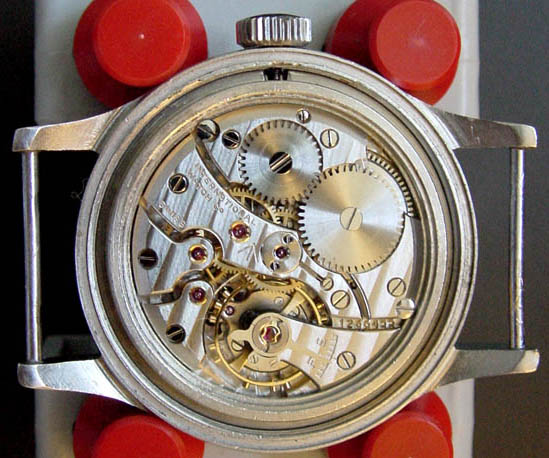   My WWW collection is now complete, time to look for new ventures! | ||||
|
| Life Achievement Military Expert |
Many thanks for the images. I don't think I was all that clear, It's not a matter of only leaving the Incabloc springs off. I mentioned the springs because they are the most visible parts of the system. For a watch with an Incabloc setting the watch would not work without the spring holding the cap jewel in place. The entire Incabloc shock proofing system would have to be taken out and substituted for an unprotected balance/cap jewel system. In a related issue, it might be a good idea to check back with IWC regarding which movement caliber(s) they used in their MK 11 military contract watches. For whatever caliber IWC used, they might also be abel to inform us of the specifications within the various govt. contracts for these watches. This data could assist in sorting out as-issued variations. Best regards, Greg | |||
|
Hi Greg, I found the answer to your question regarding the incabloc issue, although I vaguely remember reading about this a long time ago! Quote/ ...Apologies for the quasi technical jargon. Non-INCA means not INCABLOC, or not shock proof. It was thought then that, by being INCABLOC the movement would be less accurate. Understandably, the RAF went for accuracy and the movements installed in the first 2,400 Mark 11s were not shock proof. That is is why they have the suffix Anglo, which I believe means Angleterre, to differentiate them from the other Cal 98 that were INCA. The Cal 98s installed in the subsequent Mark 11s were INCABLOC. It appears that the RAF found that not being shock proof was a bigger problem than the potential loss in accuracy.... ...BTW, as I am sure you know, the first batch of 2,400 Mark 11s from 1948 were equipped with cal 89s without Incabloc, cal 89 Angl, apparently to reduce costs. I have one of those, as can be seen in the image below taken the day I got the watch, and before the movement was cleaned... ... I also do not claim to be an expert, and do not have an opinion on how INCABLOC affects accuracy, if at all. I would also like to hear the opinion of an expert on this matter. I did not make this up. I do not have this much imagination. I read somewhere, and now I just can't remember where, that in the late 1940s, either the RAF, or IWC, or both, were of the opinion that INCABLOC had an adverse effect on accuracy - it was either INCABLOC, or the accuracy required and the RAF opted for accuracy. That is the reason why the first two batches of 1,200 Mark 11s each, ordered in 1948, had non-INCA movements, when all Cal 98s that were being manufactured already had that feature. From what I understood, this turned out either not to be correct, or the loss of accuracy was negligible, and positively off-set by the longer time between repairs at Herstmonceaux, of the Mark 11s with cal 98 INCA. I'll try to find the sources... ...I found a reference on the the negative effects of INCABLOC on accuracy, on page 51 of the book IWC Pilot's Watches by Ebner Verlag, on the article Ever Upwards, The Movements of IWC's Pilot's Watches: A History of Calibers by Gisbert L. Brunner, states Although shock absorption had already been invented, W.W.W. had to make do without it because negative effects on the precision could't be completely prevented back then. I realize Brunner is referring to the cal. 83 on the W.W.W. in 1945. I have not yet found the reference on RAF's choice to install the cal. 89 Anglo without shock absorption in the first two batches of Mark 11 in 1948. In any event, at least one expert believes that in 1945 shock-proofing a movement had a negative effect on its accuracy... unquote/ Just go to IWC Forum and search IWC Mark 11 incabloc... Mark 11 Inca That´s the reason why mine has no incabloc, because it´s authentic and marked 1948! Just to be sure of this, I sent David Seyffer, the curator of the IWC Museum, a mail asking to confirm what I had read, as I suspect the initiator of the question comes from my/your special friend Enzo Liguori, why else would you dig out this topic which has been buried for longer than a year. By the way, he banned me from his forum...
for again proving what he didn´t like! ... http://germanwatch.proboards But I´m in good company, he´s banned people like Frank Roesky (THE man for Hanhart,Tutima etc. WORLDOVER) etc. because... Thou shalt have no other gods before Me. Best Regards Jimmy (Werner) My WWW collection is now complete, time to look for new ventures! | ||||
|
| Life Achievement Military Expert |
I'm still confused. It appears that military contract IWC Mk 11 watches were fitted with Caliber 89 movements. However, your earlier post states that your example as a Caliber 88 movement: "This is the information on date of production for the movement of my watch. 1946 1,130,201-1,131,400 c. 88 - 12lig. INCA" Is it possible that your IWC Mark 11 does not have the original movement? To be on the safe side, I would suggest asking IWC to double check the information provided earlier. As always, many thanks for your contributions to the forum. I hope I'm wrong about your IWC Mark 11. Best regards, Greg | |||
|
Greg, I sent my watch to IWC Schaffhausen to have it certified, not pictures or the like, as they demand to have the watch there physically to obtain the Certificate!...   The info that came out of the "date your IWC" may have a fault Date your IWC , as Cal 88 is a watch with the subsiduary small seconds at 6:00 and Cal 89 has the centre seconds. Ruminations on the International Watch Company 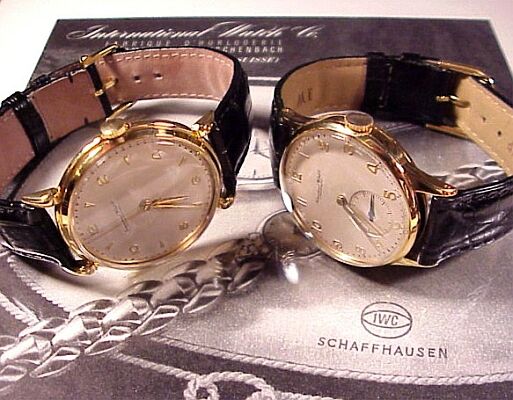 I just ran my movement number through the "date your IWC" prog again and this is what came out this time; Movement number 1,149,883 Case number 1,149,883 Main findings: Summary The movement is a calibre 89, dating from the year 1947. Valid entry in "Index of Movement Numbers" 1947 1,148,801-1,150,000 c. 89 - 12lig. S.C. Angl. Valid entries in "Index of Case Numbers" Movement No. 1,149,883 Year of production 1947 Range 1,148,801 - 1,150,000 Calibre: 89 Calibre scheme: original Lignes: 12 Shock protection: no Lignes: 12 Other specifications: Angl. Annual production 1947: 4,800,piecesTotal Years of manufacture: 1946 - 1974... So maybe I typed the wrong movement number in or there was a faulty reading the first time... My WWW collection is now complete, time to look for new ventures! | ||||
|
I had the pleasure of having a very long telephone call today, from David Seyffer, the Curator of the IWC Museum, Schaffhausen, Switzerland. He even opened his archive books for me once again, to look up my watch AGAIN. Apart from what I have already mentioned up above, he also told me that they have found a few bugs in the "Date your IWC" prog. He confirmed my watch was delivered to Goldsmiths and Silversmiths, London, the importers for the MoD on the 21 July 1947...Any more questions? My WWW collection is now complete, time to look for new ventures! | ||||
|
| Life Achievement Military Expert |
Good work Werner, Thanks to your extra effort, there is now far more depth to this post than previously available. The new data you added regarding shock protection was excellent. Now that IWC has worked out the bugs in their system I suppose they will be providing you with a new certificate listing 1947 for your watch instead of 1948. Thanks again, Greg | |||
|
Hi Greg, the dating is correct, David Seyffer pointed out to me, that the date of production has nothing to do with the date on the caseback, that caseback date is the date of issue/order. Regards My WWW collection is now complete, time to look for new ventures! | ||||
|
Hi Guys, Interesting discussion - here is a further quote from 'Man is not lost' - In light of your watch Jimmy then I guess this article needs updating. 'According to the third rule each watch required an individual serial number. This comprised a chronological number, followed by the order year after a slash. For example the number 2294/52 referred to the 2294th watch from 1952. Contrary to the assumption of most collectors these markings were not made by the RAF but were stamped by the manufacturer. This explains why the markings of the Mk 11 from IWC and JAEGER-LECOULTRE differ in style. This is also the reason why the first series of Mk 11 shows markings referring to 1948, although the watches were shipped to England no earlier than July 1949. The year given on the back is the year of the relevant order.' 'We owe thanks to IWC and JLC for their contributions, and especially to Juergen King, head of the IWC Museum, who literally spent days in the IWC archives determining any inconsistencies with IWC records, researching our clues and identifying more than 8,000 individual Mk 11 movement numbers.' | ||||
|
| Powered by Social Strata | Page 1 2 3 |
| Your request is being processed... |
|
Welcome Aboard IHC185™  Internet Horology Club 185
Internet Horology Club 185  IHC185™ Discussion Site Main Page
IHC185™ Discussion Site Main Page  Horological Discussions, Questions and Answers
Horological Discussions, Questions and Answers  Military Timepiece Discussions - EXCLUSIVE!
Military Timepiece Discussions - EXCLUSIVE!  The IWC Mark 11 and a piece of history.
The IWC Mark 11 and a piece of history.
 Internet Horology Club 185
Internet Horology Club 185  IHC185™ Discussion Site Main Page
IHC185™ Discussion Site Main Page  Horological Discussions, Questions and Answers
Horological Discussions, Questions and Answers  Military Timepiece Discussions - EXCLUSIVE!
Military Timepiece Discussions - EXCLUSIVE!  The IWC Mark 11 and a piece of history.
The IWC Mark 11 and a piece of history.©2002-2025 Internet Horology Club 185™ - Lindell V. Riddle President - All Rights Reserved Worldwide

